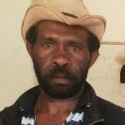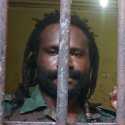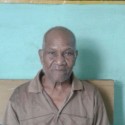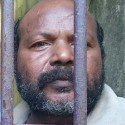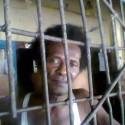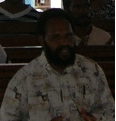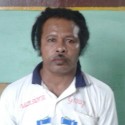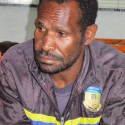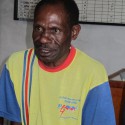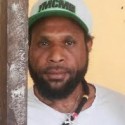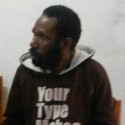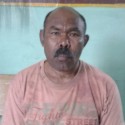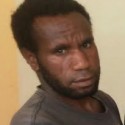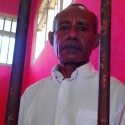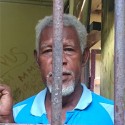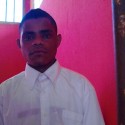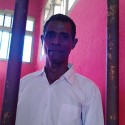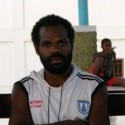
Luis Gedi made his living by working in a shop in Abepura before he was arrested and sentenced to 15 years’ imprisonment following the violence which occurred on 16 March 2006. A picket had started the day before, demanding the closure of the Freeport mine in Tembagapura and the withdrawal of security forces from the area. The Justice and Peace Secretariat (Sekretariat Keadilan dan Perdamaian, SKP) published a detailed daily chronology of the events as they unfolded in 2006, later compiled into a book entitled “Memoria Passionis di Papua.” They record that clashes began at 12:15 on 16 March as some demonstrators threw stones and bottles at the police. The confrontation intensified as police tried to storm the blockade, and three policemen and one Air Force Intelligence officer died in the fighting. Another policeman died from his injuries a few days later on 22 March.
After the clashes, SKP reports that the police Mobile Brigades (Brigade Mobil, known locally as Brimob) carried out a sweeping operation along the road and into the mountains, entering houses and dormitories. Any Papuan they came across was beaten and brought to the Jayapura City Police Headquarters. The next day the sweeping continued, commencing at 08:00 with the police shooting wildly. By the end of the day, 73 people had been arrested. Most reports published later by human rights groups claim that one or two civilians were killed in these reprisals, alongside many injured.
We were unable to find information which outlines the exact circumstances of Luis Gedi‘s arrest, but the Indonesian Working Group on Advocacy against Torture has detailed the torture he was subjected to on 16 and 17 April. Mr Gedi was reportedly punched on his left cheek, kicked with jackboots, slapped, struck with a rubber baton and wooden beams, and burned with cigarettes. The torture left him with bruises all over his body and serious damage to his eye. Some police officers identified as perpetrators include: First Sergeant Alex Suripati, Second Sergeant Irwan, Second Sergeant Taufik and First Sergeant Amir. No lawyers or legal counsel were permitted to be present during Mr Gedi’s interrogation, and his family were also barred from visiting him.
The SKP chronology relates that on 20 March Paulus Waterpauw, the director of the Papuan Criminal Investigation Bureau (Reskrim Polda Papua), said that two of the suspects, Luis Gedi and Ferdinand Pakage, had admitted to attacking the police on 16 March.
23 people were charged in total, but Mr Gedi and Mr Pakage were given the heaviest charges of all: Article 212 in conjunction with article 214, paragraph 2, which refers to resisting members of the security forces in the performance of their duties, resulting in loss of life of a security force member. This information comes from an update on the case published by the SKP on 12 June 2006.
Evidence documented by human rights lawyers and investigators strongly suggests that any confessions relating to this case were made under torture. When the Alliance of Democracy for Papua (Aliansi Demokrasi untuk Papua, ALDP) spoke to Luis Gedi in 2012, he reportedly maintained that he was not involved in the killings, as he had done from the beginning of the trial process. When journalist Andreas Harsono met Mr Pakage and Mr Gedi in prison, he was also told by Mr Gedi that he had been forced to admit to the murder of policeman Rahman Arizona, and to give the police another name. Under torture, he gave the name of his friend, Mr Ferdinand Pakage.
After the trial, the ‘Advocacy team for the Abepura clash of 16 March 2006,’ published a report into the trial proceedings. Their report claimed that the prosecutor and judges were focussed on reaching an outcome that was already decided. The prosecutors and judges also reportedly based their arguments on the initial dossiers which had been prepared during the police investigation, ignoring the fact that most of the defendants refuted the contents of those dossiers as they contained statements made under torture. The atmosphere during the trial was said to be intimidating, with several uniformed and plain-clothes police and intelligence agents present at each session. At two of the sessions, on 17 and 24 May, defendants were injured or received death threats from Brimob members, after they rejected the indictments. On 12 July, members of the Brimob unit brought two family members of the policemen who had died in the incident to the detention room where they produced a knife and threatened the defendants to confess that they had murdered their relative.
An alert issued by Amnesty International relates that four of the defence lawyers involved in the case and three people from human rights groups working on the case were followed and received intimidating messages via SMS, including death threats.
The Advocacy Team’s report also notes that the 15-year sentence handed down to Luis Gedi was three years in excess of the 12-year sentence requested by the prosecutor.
When ALDP met Mr Gedi in late 2011, he was being allowed to leave the prison from time to time, to buy equipment for the cleaning work he was doing, to visit his family and to tend his parents’ graves. He was hopeful that he would be eligible for conditional discharge in 2013.
Luis Gedi was released on 21 May 2013, after 7 years, 2 months and 5 days in prison under the condition that he reports to the police until 2016.
Sources
Advocacy team for the Abepura clash of 16 March 2006, “The report of the hearing of the case relating to the clash in Abepura on 16 March 2006 in the Abepura state court,” 21 August 2006, http://www.faithbasednetworkonwestpapua.org/userfiles/files/FurtherReading/GFSR(1).pdf
Aliansi Demokrasi untuk Papua, “Luis Gedi: Saya Belajar Tidak Menyimpan Dendam,” 17 December 2011, http://www.aldepe.com/2011/12/luis-gedi-saya-belajar-tidak-menyimpan.html
Amnesty International, ASA 21/015/2006, 5 September 2006, http://amnesty.org/en/library/asset/ASA21/015/2006/en/ada1adfd-f9d4-11dd-b1b0-c961f7df9c35/asa210152006en.pdf
Andreas Harsono, “Belajar Dari Filep Karma”, 24 February 2011, http://www.andreasharsono.net/2010/11/belajar-dari-filep-karma.html
Indonesian Working Group on Advocacy against Torture, “Annex-Shadow Report,” May 2008, http://www.elsam.or.id/downloads/1266673146_Annex_Shadow_Report_CAT.pdf
SKP Jayapura, “Memoria Passionis di Papua 2006,” 2008, http://www.papuaweb.org/dlib/baru/skp-2008-mp2006.pdf
SKP Jayapura, “Civil rights of Abepura 16 March 2006 suspects threatened,” 12 June 2006, http://lists.topica.com/lists/indonesia-act@igc.topica.com/read/message.html?sort=d&mid=812195950&start=28650
Majalah Selangkah, “Politik, Hukum & HAM Tapol Papua, Luis Gedi Bebas,” 21 May 2013, http://majalahselangkah.com/content/tapol-papua-luis-gedi-bebas
Tabloid Jubi, “Tahanan Politik Luis Gedi Bebas Bersyarat,” 21 May 2013, http://tabloidjubi.com/2013/05/21/tahanan-politik-luis-gedi-bebas-bersyarat/




